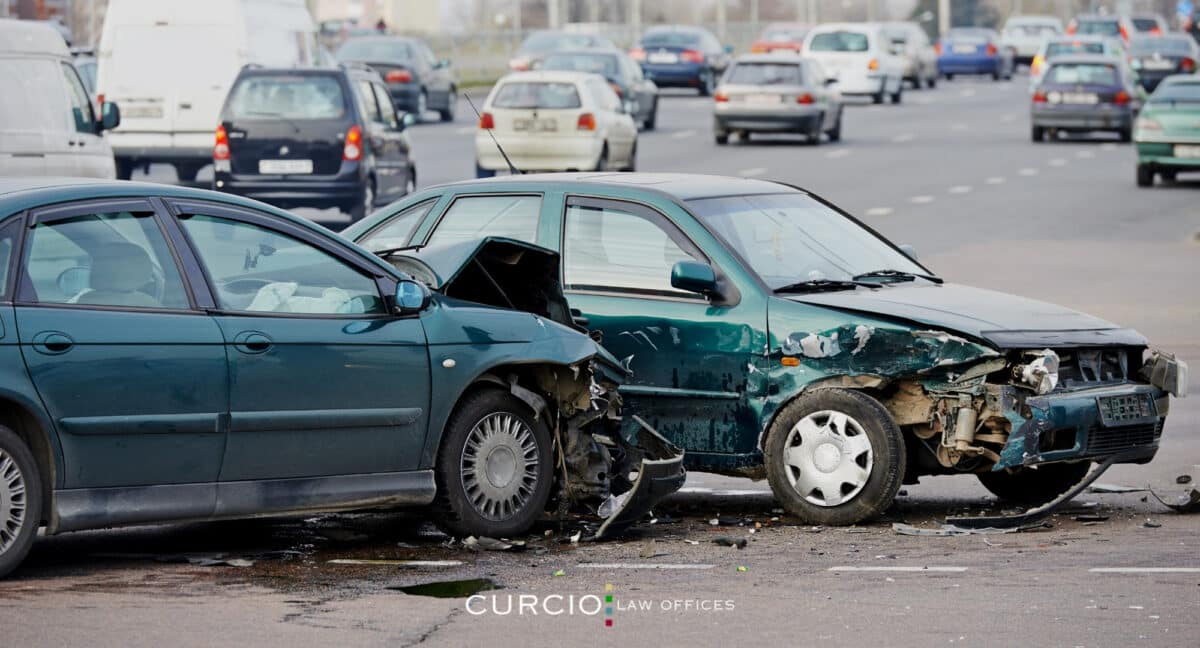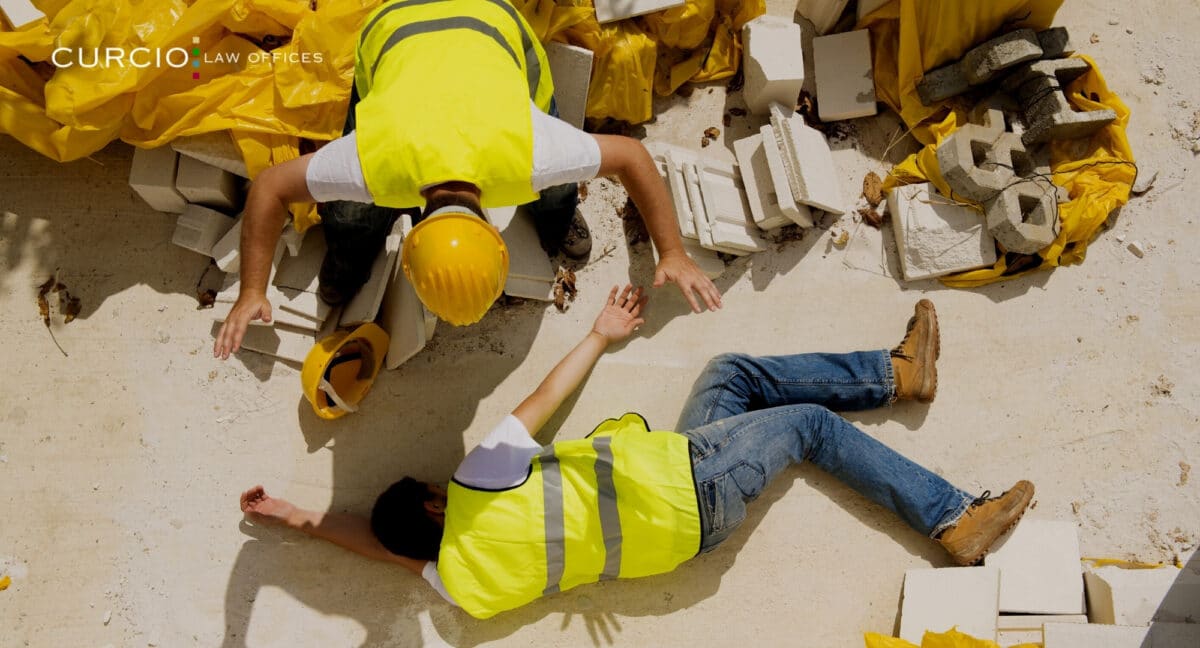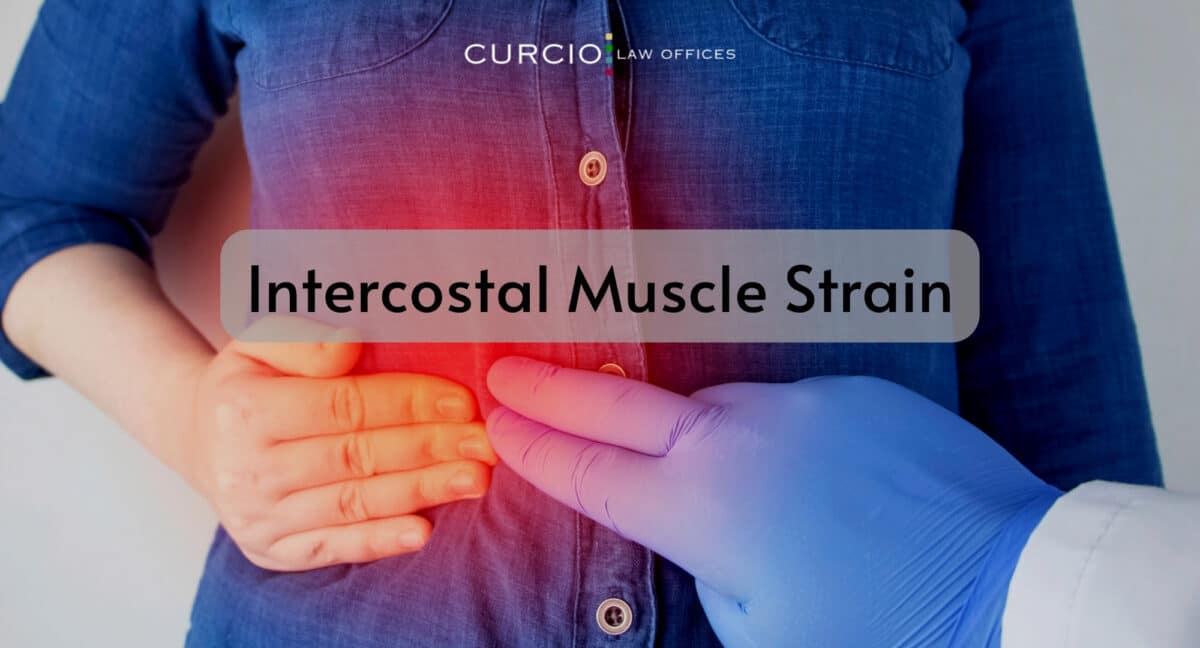An intercostal muscle strain may sound like a minor injury that requires very little professional medical advice, but severe strains can feel similar to a broken rib. Additionally, severe strains can force people to take extensive time off work to receive appropriate medical care – which sometimes involves surgery – and heal at home. The combination of taking time off work and racking up potentially thousands of dollars in medical debt can become a major financial stressor for anyone. Maybe you suffered this type of injury through a work accident or a car accident and you’re wondering: what are my options?
Chicago’s best personal injury attorneys at Curcio & Casciato discuss symptoms, causes, and treatments for intercostal muscle strains as well as whether or not you should pursue legal action. For more information, call our office today at 312-321-1111.
What is an Intercostal Muscle Strain?
An intercostal muscle strain is basically a pulled, strained, or torn rib muscle. There are three types of intercostal muscles that fill the space between each rib: external, internal, and innermost intercostal muscles. It is possible to strain or tear any of these muscles through repetitive motions or a direct blow to the rib cage.
Maybe you’ve never heard of the intercostal muscles until now. But believe it or not, intercostal muscle strains can cause up to 50% of musculoskeletal chest pain according to a 2013 study.
Grading Muscle Strains
A healthcare provider will grade muscle strains depending on their severity.
- Grade 1: This is the mildest type of muscle strain that generally heals within a few weeks. If your intercostal strain falls into this category, that means you’ve damaged less than 5% of your rib muscle fibers. You may experience manageable upper body pain and a limited range of motion.
- Grade 2: Intercostal muscle strains that fall into this category generally come with more severe pain and a significant loss of your normal range of motion. It may take several months before your strained muscle heals.
- Grade 3: This is the most severe type of strained muscle. Some people even mistake the significant loss of range of motion and the rib pain for a fractured rib. Grade 3 means there has been a complete tear of the intercostal muscle. Surgery may be an important part of the healing process for grade 3 muscle strains.
Symptoms of Intercostal Muscle Strain
Symptoms of an intercostal muscle strain include:
- Difficulty breathing
- Sharp pain when coughing, sneezing, laughing, or taking a deep breath
- Loss of range of motion
- Gradual worsening pain during repetitive movements and physical activity
- Sudden severe pain after a traumatic accident, such as a slip and fall or car accident
- Muscle tightness in the affected area
- Swelling, bruising, or tenderness in the affected area
- Muscle spasms in the upper body or chest wall
What Causes an Intercostal Muscle Strain?
Intercostal muscle pain or strains are most commonly caused by repetitive twisting or direct trauma. If you’re currently suffering from pain radiating from your rib muscles, ask yourself if any of the events listed below have happened to you recently.
- Sudden twisting during weight lifting, yoga, job duties, housework, etc.
- A direct blow to your torso from a slip and fall, a car accident, a work accident, a sports accident, domestic violence, etc.
- Reaching or lifting heavy objects over your head at work, at home, etc.
- A general increase in physical activity, especially if you’ve spent many years being inactive. Upper body muscles can be fairly weak and prone to future muscle strains when you first start working out.

Rib Fracture vs. Intercostal Muscle Strain
Maybe you just got into a car crash and you’re now experiencing intense rib pain which is making you wonder: do I have a rib stress fracture or just strained muscles? While the two rib injuries can feel similar, the musculoskeletal chest pain associated with a fractured rib is generally much more severe. Rib fracture sufferers may also experience:
- Difficulty breathing or sharp pain during deep breathing
- A general feeling of breathlessness
- A visible, unnatural protrusion of one or more rib bones
- Extreme tenderness around the broken rib
If you’re experiencing any of the aforementioned symptoms after a major accident, it’s crucial that you go to the doctor for a physical examination. They will determine if your pain is coming from the intercostal muscles or from a broken rib.
Treatments for an Intercostal Muscle Strain
Treatment options for the external intercostals, internal intercostals, or innermost intercostals vary based on the severity of the muscle injury. If you suffered a Grade 3 intercostal strain, you may need surgery. But if you suffered a less severe intercostal muscle strain, your doctor may recommend one of the following treatments.
Rest
Both rest and movement are crucial for healing injured muscles. First and foremost, you should rest and avoid intense physical activity for the first few days or weeks after your muscle strain. Intense exercise can definitely make your intercostal muscle pain worse and delay the healing process. As you heal, you can slowly get back into gentle physical activity like walking, stretching, doing yoga, etc.
Pain Medication
The best way to relieve pain and reduce swelling from an intercostal muscle strain is through pain relievers like ibuprofen and acetaminophen. Make sure to ask your doctor which pain medication is best for you and your injury.
For intense muscle spasms, doctors may also prescribe muscle relaxants. If all these medications fail to control pain and swelling, your doctor may recommend steroid or lidocaine injections.
Physical Therapy and Gentle Stretching
If a physical exam and imaging tests reveal that you suffered a severe intercostal muscle strain, your doctor may recommend that you see a physical therapist once your injury is mostly healed.
Physical therapy will teach you several stretching exercises that are designed to help you slowly regain your normal range of motion in your upper body and torso. Additionally, physical therapy can help you strengthen your intercostal muscles in order to avoid future muscle strains.
Heat Therapy and Cold Therapy
Both cold and heat therapy can help reduce pain in the intercostal muscles. Start with an ice pack on your ribs for 15 to 30 minutes at a time for the first couple of days. Then switch to a heating pad or a warm bath.
Deep Breathing Exercises
Because intercostal muscle strains often make it difficult or painful to breathe, it’s important to do breathing exercises while you heal. Not only will deep breathing help the healing process, but it will also help your stress levels.
The best way to do breathing exercises with injured intercostal muscles is to hold a pillow to the injured area. Take a long deep breath through your nose, hold it for a few seconds, and then slowly breathe out through your mouth. Imagine that you’re filling up your lungs with as much air as possible during these exercises. Repeat these deep breaths for 5 to 10 minutes at a time.
Can I Sue for an Intercostal Muscle Strain?
If you suffered a minor intercostal muscle strain from a negligent driver, for example, it’s not worth going through the trouble to sue that negligent driver. However, if a negligent driver crashes into you and causes you to completely tear your intercostal muscles and suffer a few other catastrophic injuries, you may have grounds to file a personal injury lawsuit against them.
Proving the Four Elements of Negligence
If a personal injury attorney at Curcio Law believes that you have grounds to pursue legal action for your injuries, you must then prove the four elements of negligence.
- Duty of Care: Every person owes each other a specific duty of care at work, on the roads, in public spaces, etc.
- Breached Duty of Care: The negligent person in question breached this duty of care.
- Causation: The negligent person’s actions directly caused your severe intercostal muscle strain.
- Damages: The negligent person in question caused you to suffer multiple types of damages for which you should receive fair compensation.
Compensation for Tearing the Intercostal Muscles
If you suffered a Grade 3 intercostal muscle strain due to someone else’s negligence that required surgery and sick days from work in order to recover, you could recover some of the damages listed below.
- All medical bills for medications, surgeries, injections, scans, etc.
- Physical therapy bills
- Lost wages
- Loss of earning capacity if your intercostal muscle injury prevents you from performing certain job duties
- Physical pain and suffering
- Emotional distress

Call Curcio & Casciato Today
Severe intercostal muscle strains from a work accident or a car accident, for example, can put you out of commission for several weeks or months. If your injury causes you to miss work and spend thousands of dollars in medical bills, you may have grounds to file a personal injury case or pursue worker’s compensation benefits. Whatever the case may be, Chicago’s best personal injury attorneys at Curcio Law can help. Call us today at 312-321-1111 today.



